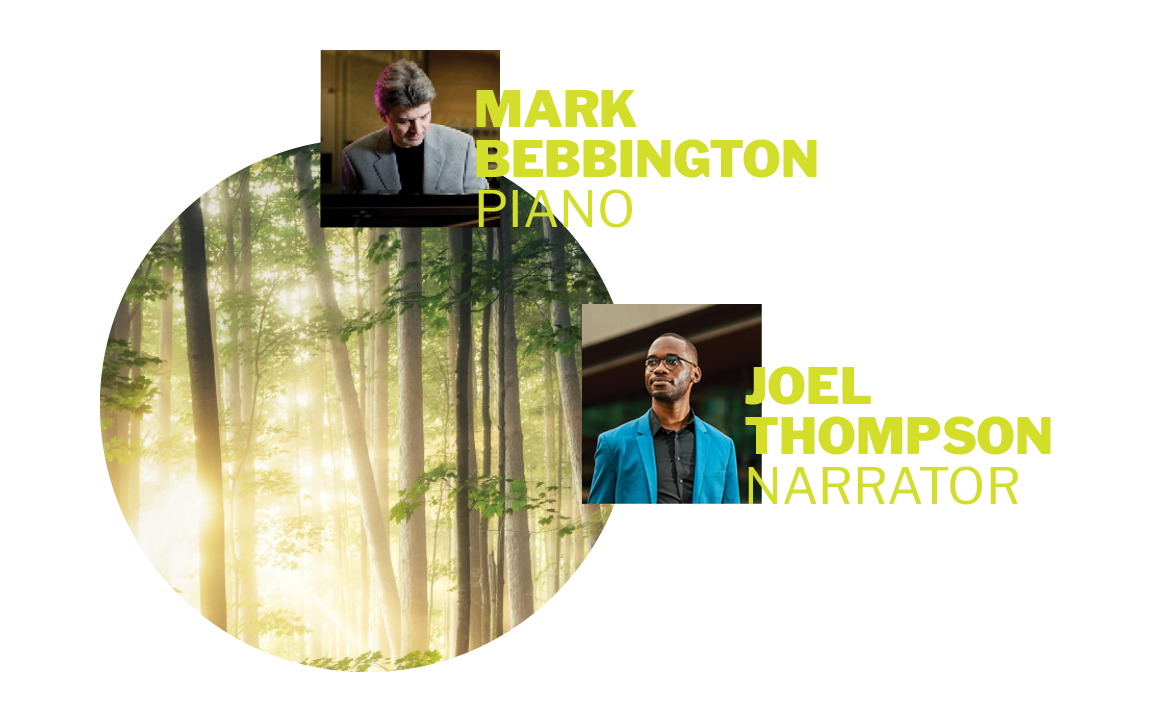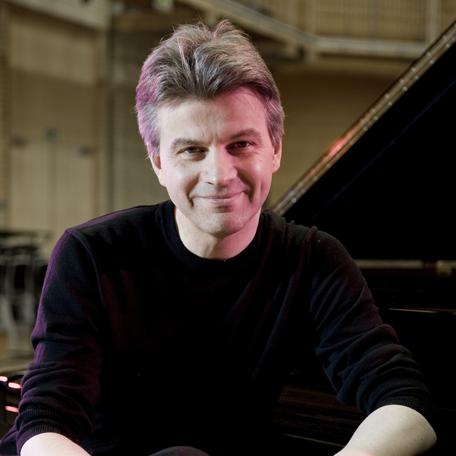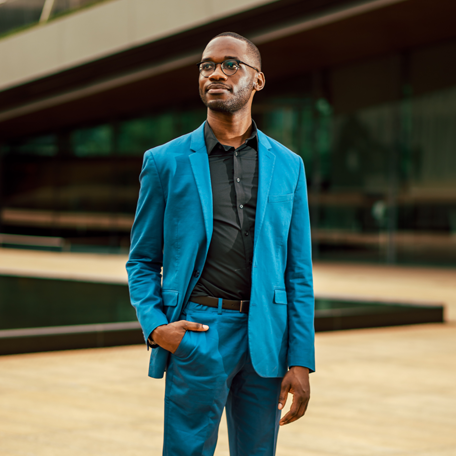LIGHT, RIGHT AND FANCIFUL FLIGHT
Saturday, May 13 at 7:30pm
Sunday, May 14 at 3:00pm

LIGHT, RIGHT AND FANCIFUL FLIGHT
Saturday, May 13 at 7:30pm
Sunday, May 14 at 3:00pm

LIGHT, RIGHT AND FANCIFUL FLIGHT
Saturday, May 13 at 7:30pm
Sunday, May 14 at 3:00pm

Location
The Palace Theatre
61 Atlantic Street, Stamford, CT 06901
Duration
2 hours with a 20
minute intermission
Share With
About this performance
British pianist Mark Bebbington plays one of Mozart’s greatest achievements. This concerto is unusually personal, intimate, and lyrical—imbued with remarkable elegance, and at peace with the world. Joel Thompson, already a force in American music, has made the case through his music for the marriage of art and activism. Awaken the Sleeper is music of principle and shines a light on the question of justice in our world. And beginning and closing, more light – Carolyn Bremer’s brilliant showpiece Early Light incorporates an affectionate baseball nod to our national pastime, as well as the National Anthem. Finally, the magic and fantasy of Stravinsky’s revolutionary ballet music, The Firebird, a hypnotic melodic invention and rhythmic frenzy, concludes in a blaze of glory.
Michael Stern, conductor
Mark Bebbington, piano
Joel Thompson, narrator
Behind the Baton
Learn more about the program during this pre-concert talk hosted by Music Director Michael Stern. Behind the Baton begins one hour before each concert at the Palace Theater.
MusiKids
A 40-minute, interactive pre-concert activity for families led by an Orchestra musician. MusiKids begins one hour before our Sunday concerts at The Palace Theatre.
This event is FREE with your ticket to the concert.
Sunday tickets for kids (ages 17 and under) are only $4 with the purchase of a regular ticket.
Musical Program to include
Carolyn Bremer Early Light
Mozart Piano Concerto No. 23
Joel Thompson To Awaken the Sleeper
Stravinsky The Firebird, Suite (1919)
Featured Artists
Mark Bebbington piano

The critical plaudits which have greeted Mark Bebbington’s performances and recordings have singled him out as a British pianist of the rarest refinement and maturity (“Bebbington is without doubt one of Britain’s finest pianists.” wrote Michel Fleury recently in Classica).
Internationally recognised as a champion of British music, in particular, Mark has recorded extensively for the Somm label to critical acclaim, with no fewer than nine of his recent CDs awarded 5***** by BBC Music Magazine.
His most recent CDs include three British Piano Concertos with the City of Birmingham Symphony Orchestra, an all-Gershwin album with Leon Botstein and the Royal Philharmonic Orchestra (“Recording of the Month” from MusicWeb International). A CD of Concertos by Grieg (including the premiere of his sketches for a Second Piano Concerto, edited by Robert MatthewWalker) and Delius with the Royal Philharmonic Orchestra and Jan Latham-Koenig was released in April 2018 and became ‘CD of the Week’ in The Times and Mail on Sunday.
His premiere recordings include one of Arnold Bax’s Piano Concertino coupled with John Ireland’s Piano Concerto and Legend, and premieres of Vaughan Williams’s Fantasia and William Mathias’s first two Piano Concertos (Ulster Orchestra).
In addition to concerto recordings, Mark completed his John Ireland and Frank Bridge solo piano series and released a CD of William Alwyn’s piano works in 2015. As well as his BBC Music Magazine success, he has won Gramophone Magazine’s ‘Editor’s Choice’, International Record Review’s ‘Outstanding’ accolade and many others. International Piano Magazine wrote of him, ‘Bebbington’s revivals of British piano music are second to none; he could well be dubbed the concert pianists’ Richard Hickox. Bebbington has almost single-handedly demonstrated that 20th-century British piano scores have an exciting role to play in the concert hall and recording studio”.
Over recent seasons Mark has toured throughout Central and Northern Europe and in the United States (both as recitalist and as soloist with some of the world’s leading orchestras), as well as the Far East and North Africa. In 2017 he made his Carnegie Hall debut with Leon Botstein and the American Symphony Orchestra and also appeared with the Buffalo Symphony Orchestra and on tour with the Israel Camerata and Czech National Orchestra. Within the UK, he has appeared in concertos with the London Philharmonic, Royal Philharmonic and Philharmonia Orchestras, Flanders Symphony Orchestra, the London Mozart Players, Orchestra of the Swan and BBC Concert Orchestra. He has featured both as soloist and recitalist on BBC Television and Radio and also on major European Television and Radio networks.
Mark studied at the Royal College of Music where he was a recipient of numerous international awards and prizes, including a Leverhulme Scholarship, a Winston Churchill Fellowship and the Ivan Sutton Recording Prize – the latter awarded to the one outstanding graduate of the combined London Music Colleges. He later studied in Italy with the legendary Aldo Ciccolini.
Joel Thompson narrator

Joel Thompson is an Atlanta-based composer, conductor, pianist, and educator, best known for the choral work, Seven Last Words of the Unarmed, which was premiered in November 2015 by the University of Michigan Men’s Glee Club and Dr. Eugene Rogers and won the 2018 American Prize for Choral Composition. In August 2021 he premiered another new work in Boulder at the Colorado Music Festival; the piece sets the writings of James Baldwin to music. Thompson’s works have been performed by esteemed ensembles such as the Atlanta Symphony Orchestra, Tallahassee Symphony Orchestra, Atlanta Master Chorale, Los Angeles Master Chorale, EXIGENCE, and the San Francisco Gay Men’s Chorus. Currently a doctoral student at the Yale School of Music, Thompson was also a 2017 post-graduate fellow in Arizona State University’s Ensemble Lab/Projecting All Voices Initiative and a composition fellow at the 2017 Aspen Music Festival and School, where he studied with composers Stephen Hartke and Christopher Theofanidis and won the 2017 Hermitage Prize. Thompson taught at Holy Innocents’ Episcopal School in Atlanta from 2015 to 2017, and also served as Director of Choral Studies and Assistant Professor of Music at Andrew College from 2013 to 2015. Thompson has a B.A. in Music and an M.M. in Choral Conducting, both from Emory University.
Program Notes
Early Light
Carolyn Bremer
1957-2018
Carolyn Bremer started her musical career as an orchestral bass player, studying at Eastman and the University of California at Santa Barbara. She was for nine years Chair of Composition at the University of Oklahoma, followed by becoming Associate Director of the Bob Cole Conservatory at California State University at Long Beach.
Composed for the Oklahoma City Philharmonic in 1995, Early Light reflected Bremer’s passionate love of baseball since childhood. According to notes in the score, the material is largely derived from the Star-Spangled Banner, not out of patriotic fervor, but out of the feelings of happy anticipation at hearing the anthem before the ball game. The slap heard near the end echoes the crack of the bat on a home run.
Soon after the premiere, Bremer transcribed Early Light for concert band, in which form it has become a smash hit.
Piano Concerto No. 23 in A major K. 488
Wolfgang Amadeus Mozart
1756-1791
During the period between 1782 and 1786, Mozart completed no fewer than twelve piano concertos, many of them exploring new structural and harmonic territory. The A major Concerto, one of his most popular, is not only a powerfully emotional work – especially the second movement – but is also of historical interest. It was one of three concertos he was to perform in Vienna during the Lenten season of 1786, and among the first of his works to make use of clarinets.
Preliminary sketches for this work exist, demonstrating – contrary to legend – that Mozart wasn’t always composing on the fly. In fact, he kept notebooks containing musical ideas to be used at a later time, works in progress and even some brief sketches eventually abandoned altogether. About 320 fragments and sketches have survived, although clearly many more were discarded by Mozart himself and still more by his widow Constanze. Sketches for part of the first movement, an abandoned second movement in D major and the Finale, reveal that this work was already under way in 1784, two years before its completion. This evidence also demonstrates that Mozart sometimes devoted great care in revising and polishing his music.
This Concerto belongs to a group of five that Mozart dedicated to his early patron Joseph Wenzeslaus von Fürstenberg, the reigning Prince of Donaueschingen in southwest Germany, a well-known center for the promotion of new music to this day. In a letter to the Prince, Mozart reveals that these were works “for my own use and for a small group of music-loving friends…had never seen the light of day.”
The opening movement in the modified sonata form used for the classical concerto, comprises two lyrical principal themes – rather than the usual contrasting themes – separated by a more harmonically unstable bridge, plus a syncopated closing theme. The bulk of the movement involves the interplay of brief fragments of the themes presented during the exposition. The fairly simple cadenza is the only surviving solo cadenza Mozart wrote into a score. Usually, he either wrote out cadenzas separately or improvised them in performance. Generations of composers and pianists have taken advantage of the creative freedom allowed in the cadenza to supply their own.
The second movement is the only piece Mozart ever composed in f-sharp minor, the relative minor to A major. While the mood is extremely intense, the orchestration is quite light; and it is probable that the piano part was originally embellished with improvised ornamentation. Those interested in the nature of such improvised embellishments should consult Mozart’s earlier Concerto No. 9, “Jeunehomme,” K. 271, in which Mozart wrote out elaborate ornamentation for the piano in the second movement.
The sprightly rondo of the Finale is a sharp contrast to the pathos of the preceding movement. It suggests a happy release from a dark night of the soul.
To Awaken the Sleeper
Joel Thompson
b. 1988
Born in the Bahamas to Jamaican parents and moving to Houston at age 10, American composer educator and choral conductor Joel Thompson studied at Emory University for his M.M. in choral conducting, and is currently finishing his D.M.A in composition at Yale School of Music. His best-known work to date is Seven Last Words of the Unarmed, premiered in 2015, winning him the 2018 American Prize for Choral Composition. The challenging texts in the work triggered a backlash, with a significant turnaround following the George Floyd killing.
Composed in the shadow of the George Floyd killing and the Covid-19 pandemic, To Awaken the Sleeper takes its text from the writing of James Baldwin. It opens with a quote from Baldwin’s 1971 An Open Letter to My Sister, Miss Angela Davis:
“So be it! So be it. We cannot awaken [the] sleeper, and God knows we have tried. We must do what we can do, and fortify and save each other—[…] We know that democracy does not mean the coercion of all into a deadly—and, finally, wicked—mediocrity but the liberty for all to aspire to the best that is in us, or that has ever been.”
Thompson wrote the work with the encouragement of one of his mentors at Yale, conductor Peter Oundjian, who conducted the premiere at the Colorado Music Festival in August 2021.
Suite from The Firebird (1919)
Igor Stravinsky
1882-1971
“He is a man on the eve of fame,” said Sergey Diaghilev, impresario of the famed Ballets Russes in Paris, during the rehearsals for Igor Stravinsky’s The Firebird.
In 1909 Stravinsky, viewed as a budding composer just emerging from the tutelage of Nikolay Rimsky-Korsakov, got what can be called his big break, thanks to the laziness of the composer Anatoly Lyadov. Early in the year Diaghilev had written Lyadov: “I am sending you a proposal. I need a ballet and a Russian one, since there is no such thing. There is Russian opera, Russian dance, Russian rhythm – but no Russian ballet. And that is precisely what I need to perform in May of the coming year in the Paris Grand Opera and in the huge Royal Drury Lane Theater in London…The libretto is ready…It was dreamed up by us all collectively. It is The Firebird – a ballet in one act and perhaps two scenes.” When Diaghilev heard that after three months Lyadov had only progressed so far as buying music manuscript paper, he withdrew the commission and offered it to Aleksander Glazunov and Nikolay Tcherepnin, who both turned him down. In desperation he turned to the unknown Stravinsky.
Stravinsky finished the score in May 1910, in time for the premiere on June 25. It was an instant success and has remained Stravinsky’s most frequently performed work. Its romantic tone, lush orchestral colors, imaginative use of instruments and exciting rhythms outdid even Stravinsky’s teacher, the Russian master of orchestration. It required an immense orchestra and the first suite Stravinsky extracted from the ballet in 1911 strained symphony orchestras’ resources. He made two subsequent revisions, with modified orchestration, the final one in 1945.
The ballet, taking its plot from bits of numerous Russian folk tales, tells the story of the heroic Tsarevich Ivan who, while wandering in an enchanted forest, encounters the magic firebird as it picks golden fruit from a silver tree. He traps the bird but, as a token of goodwill, frees it. As a reward, the bird gives Ivan a flaming magic feather. At dawn the Tsarevich finds himself in a park near the castle of the evil magician Kashchey. Thirteen beautiful maidens, captives of Kashchey, come out of the castle to play in the garden but one of them in particular, the beautiful Tsarevna, captures Ivan’s heart. As the sun rises, the maidens have to return to their prison and the Tsarevna warns Ivan not to come near the castle lest he fall under the magician’s spell as well. In spite of the warning, the Tsarevich follows and opens the gate of the castle. With a huge crash Kashchey and his retinue of monsters erupts from the castle in a wild dance, whose drive and clashing harmonies foreshadow The Rite of Spring. With the help of the magic feather the Tsarevich calls the Firebird who overcomes Kashchey and tames the monsters by lulling them to sleep. In the end the captives are freed from the spell and Tsarevich Ivan and the Tsarevna are married in a grand ceremony culminating in an apotheosis of the Firebird.
Narration
Awaken the Sleeper
To Awaken the Sleeper
“So be it! So be it. We cannot awaken [the] sleeper, and God knows we have tried. We must do what we can do, and fortify and save each other—[…] We know that democracy does not mean the coercion of all into a deadly—and, finally, wicked—mediocrity but the liberty for all to aspire to the best that is in us, or that has ever been.”
“Well, if one really wishes to know how justice is administered in a country, one does not question the policemen, the lawyers, the judges, or the protected members of the middle class. One goes to the unprotected – those, precisely, who need the law’s protection most! – and listen to their testimony.”
“Ask any Mexican, any Puerto Rican, any Black man, any poor person —ask the wretched how they fare in the halls of justice, and then you will know whether or not it has any love for justice, or any concept of it.”
“Ask the wretched how they fare in the halls of justice, and then you will know whether or not [this country] has any love for justice, or any concept of it. It is certain, in any case, that ignorance, allied with power, is the most ferocious enemy justice can have.”
“Power, which can have no morality in itself, is yet dependent on human energy, on the wills and desires of human beings. When power translates itself into tyranny, it means that the principles on which that power depended, and which were its justification, are bankrupt. When this happens, and it is happening now, power can only be defended by thugs and mediocrities – and seas of blood.”
“The representatives of the status quo are sickened and divided, and dread looking into the eyes of their young; while the excluded begin to realize, having endured everything, that they can endure everything. They do not know the precise shape of the future, but they know that the future belongs to them. They realize this—paradoxically—by the failure of the moral energy of their oppressors and begin, almost instinctively, to forge a new morality, to create the principles on which a new world will be built.”
“We are living in a world in which everybody and everything is interdependent. It is not white, this world. It is not Black either. The future of this world depends on everyone in this room. And that future depends on to what extent and by what means we liberate ourselves from a vocabulary which now cannot bear the weight of reality.”
Program notes by:
Joseph & Elizabeth Kahn
Wordpros@mindspring.com
www.wordprosmusic.com
*artists and programs subject to change







